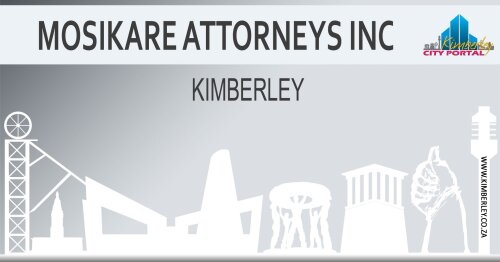Best Land Use & Zoning Lawyers in Kimberley
Share your needs with us, get contacted by law firms.
Free. Takes 2 min.
Free Guide to Hiring a Real Estate Lawyer
List of the best lawyers in Kimberley, South Africa
About Land Use & Zoning Law in Kimberley, South Africa
Land Use and Zoning law in Kimberley, South Africa typically dictate the way land and property are utilized and segmented in this major city. The associated laws and regulations guide sustainable urban development and maintain the desired aesthetic value of the city. The approval of land-based developments, construction permits, and zoning compliance are typically guided by the Spatial Planning and Land Use Management Act (SPLUMA), a national legislation applied in Kimberley.
Why You May Need a Lawyer
Legal help is often necessary in interpreting complex Land Use and Zoning laws and navigating through the tedious process of permit approval. You may require a lawyer when applying for rezoning applications, submitting an objection to a development proposal, seeking evaluation of environmental impacts, or dealing with land use disputes and violations. Lawyers can also provide assistance in ensuring your proposed development project complies with Kimberley's land use regulations and zoning laws.
Local Laws Overview
The primary piece of legislation governing Land Use and Zoning in Kimberley is the Spatial Planning and Land Use Management Act (SPLUMA) of 2013. Kimberley, like other South African municipalities, is also governed by its Municipal Land Use Planning By-Law. These laws regulate matters including the division and consolidation of land parcels, land development applications, and rezoning of land. They are designed to ensure sustainable and efficient use of land while preserving the social, economic, and aesthetic features of the city.
Frequently Asked Questions
1. What is zoning?
Zoning refers to laws that dictate the uses permitted for a particular piece of land. These laws define different zoning categories such as residential, commercial, industrial, or special use and regulate factors such as building density, size, and height.
2. Can I apply for rezoning of my property?
Yes, property owners can apply for rezoning. However, the approval of such an application is dependent on various factors, including a compliance review under the relevant laws and the city's long-term land use.
3. How do I apply for a construction permit?
To apply for a construction permit, you need to submit an application to the local municipality. The application must include details of the proposed project and demonstrate compliance with zoning laws and building regulations. It's advisable to engage a lawyer to navigate this process.
4. What happens if I violate zoning laws?
Zoning law violations can lead to enforcement actions, including fines, penalties, or the requirement to reverse the unauthorised development. In severe cases, this can lead to legal action.
5. How can I object to a development proposal in my neighbourhood?
You can lodge a formal objection to a development proposal with the municipal council. It's recommended to consult with a lawyer to ensure your objection is legally sound and increases the chances of being upheld.
Additional Resources
The Department of Rural Development and Land Reform and local municipal authority (Sol Plaatje Municipality) are helpful resources for more information. You can also check the official South African Government Services' website for detailed guides on various land use and zoning procedures.
Next Steps
If you require legal assistance in Land Use & Zoning, the first step is to consult with a lawyer who specializes in this area. Contact your local Law Society for a list of recognized Land Use & Zoning lawyers in Kimberley. Prepare all relevant documents prior to the consultation, such as property deeds, building plans, zoning notices, or correspondence related to the issue at hand to get the best advice.
Lawzana helps you find the best lawyers and law firms in Kimberley through a curated and pre-screened list of qualified legal professionals. Our platform offers rankings and detailed profiles of attorneys and law firms, allowing you to compare based on practice areas, including Land Use & Zoning, experience, and client feedback.
Each profile includes a description of the firm's areas of practice, client reviews, team members and partners, year of establishment, spoken languages, office locations, contact information, social media presence, and any published articles or resources. Most firms on our platform speak English and are experienced in both local and international legal matters.
Get a quote from top-rated law firms in Kimberley, South Africa — quickly, securely, and without unnecessary hassle.
Disclaimer:
The information provided on this page is for general informational purposes only and does not constitute legal advice. While we strive to ensure the accuracy and relevance of the content, legal information may change over time, and interpretations of the law can vary. You should always consult with a qualified legal professional for advice specific to your situation.
We disclaim all liability for actions taken or not taken based on the content of this page. If you believe any information is incorrect or outdated, please contact us, and we will review and update it where appropriate.














